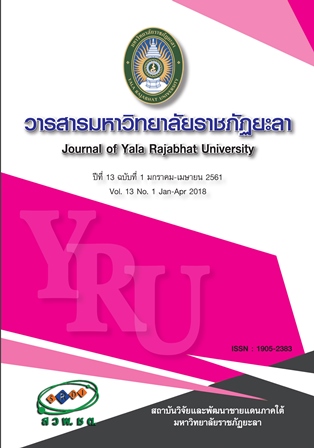การวิเคราะห์ความเที่ยงตรงและความไม่แปรเปลี่ยนของโมเดลความสัมพันธ์เชิงสาเหตุ ของความสุขในการทำงานของพนักงาน บริษัท ซูมิโตโม อีเล็คตริก ไวริ่ง ซิสเต็มส์ (ประเทศไทย) จำกัด
Main Article Content
บทคัดย่อ
การวิจัยนี้มีวัตถุประสงค์ เพื่อ 1) ศึกษาความสัมพันธ์ระหว่างองค์ประกอบของแต่ละตัวแปรในโมเดลความสุขในการทำงาน 2) ตรวจสอบความเที่ยงตรงของโครงสร้างความสัมพันธ์เชิงสาเหตุของโมเดลความสุขในการทำงาน 3) วิเคราะห์ อิทธิพลรวม ทางตรง ทางอ้อม ของโมเดลความสัมพันธ์เชิงสาเหตุของความสุขในการทำงาน และ 4) ตรวจสอบความไม่แปรเปลี่ยนของโมเดลความสัมพันธ์เชิงสาเหตุของความสุขในการทำงานระหว่างกลุ่ม Staff และ Operator โดยกลุ่มตัวอย่างที่ใช้ในการวิจัยเป็นพนักงานบริษัทซูมิโตโม อีเล็คตริก ไวริ่ง ซิสเต็มส์ (ประเทศไทย) จำกัด จังหวัดระยอง จำนวน 500 คน ใช้เทคนิคการสุ่มกลุ่มตัวอย่างแบบหลายขั้นตอน เครื่องมือที่ใช้ในการวิจัยเป็นแบบสอบถามประเภทมาตราส่วนประมาณค่า 6 ระดับ ทำการวิเคราะห์ข้อมูลพื้นฐาน ตรวจสอบความเที่ยงตรงของโมเดลและความไม่แปรเปลี่ยนของโมเดลด้วยเทคนิคการวิเคราะห์โมเดลสมการโครงสร้าง ผลการวิจัยพบว่า 1) ตัวแปรสังเกตได้ทุกคู่มีความสัมพันธ์กันในทางบวกอย่างมีนัยสำคัญทางสถิติที่ระดับ .01 2) โมเดลความสัมพันธ์เชิงสาเหตุของความสุขในการทำงานตามสมมติฐานมีความสอดคล้องกับข้อมูลเชิงประจักษ์ 3) ความพึงพอใจในการทำงานมีอิทธิพลทางตรงต่อความสุขในการทำงาน ส่วนสัมพันธภาพระหว่างบุคคลและสภาพแวดล้อมในการทำงานมีอิทธิพลทางอ้อมต่อความสุขในการทำงานอย่างมีนัยสำคัญทางสถิติที่ระดับ .01 ซึ่งทั้ง 3 ตัวแปร ร่วมกันอธิบายความแปรปรวนของความสุขในการทำงานได้ร้อยละ 79.90 และ 4) โมเดลความสัมพันธ์เชิงสาเหตุของความสุขในการทำงาน ระหว่างกลุ่ม Staff และ Operator มีความไม่แปรเปลี่ยนบางส่วน
Article Details
บทความ ข้อมูล เนื้อหา รูปภาพ ฯลฯ ที่ได้รับการเผยแพร่ในวารสารมหาวิทยาลัยราชภัฏยะลานี้ ถือเป็นลิขสิทธิ์ของวารสารมหาวิทยาลัยราชภัฏยะลา หากบุคคลหรือหน่วยงานใดต้องการนำทั้งหมดหรือส่วนหนึ่งส่วนใดไปเผยแพร่ต่อหรือกระทำการใดๆ จะต้องได้รับอนุญาตเป็นลายลักษณ์อักษรจากวารสารมหาวิทยาลัยราชภัฏยะลาก่อนเท่านั้น
เอกสารอ้างอิง
(in Thai)
2.Chiumento, S. (2007). Happiness at work index research report [Online]. Retrieved November
9, 2014, from: http://www.chiumento.co.uk.
3.Department of Industrial Promotion. (2008). New Entrepreneurs Creation [Online]. Retrieved
December 30, 2014, from: http://nec.dip.go.th/เกี่ยวกับโครงการ/tabid/54/ Default.aspx.
(in Thai)
4.Diener, E. (2003). Subjective Well-Being. Psychological Bulletin, 95(3), 542-575.
5.Diener, E. & Seligman, M. E. P. (2004). Beyond Money: Toward an economy of well-being.
Psychological Science in the Public Interest, 5, 1-31.
6.Kline, R. B. (2005). Principles and practice of structural equation modeling (2nd ed.). New York:
Guilford Press.
7.Gibson, J. L., Ivancevich, J. M. & Donnelly, J. H. Jr. (1997). Organizations: Behavior, structure,
Processes (9th ed.). Boston: The Mcgraw-Hill companies , Inc.
8.Gliangaksorn, A. (2013). Relationship Between Emotion Quotients, Interpersonal Relationship
in Organization And Job Satisfaction of Personnel in Private Hospitals. Master’s Thesis.
King Mongkut’s University of Technology North Bangkok. (in Thai)
9.Herzberg, F. (1993). A harvard business review paperback: motivation. Massachusetts: Harvard
Business School.
10.Heylighen, F., Bollen, J. & Riegler, A. (1999). The evolution of complexity. Dordrecht: Kluwer
Academic Publishers.
11.Kunracha, K. (2013). The relationships between participative management of head nurses,
working environment, and job satisfaction of professional nurses at General Hospitals,
Region 3. Journal of nursing and education, 6(1), 130-142. (in Thai)
12.Laphnimitrchai, W. (2003). The Study of the Influenced Factors on Job Satisfaction Case Study
of Telephone Administrative Office Sector of Central Region Telephone Service 1.2.
Master’s Independent study. Rajabhat Institute Suan Dusit. (in Thai)
13.Luthans, F. (1998). Organizational behavior. (8th ed.). Boston: Irwin/McGraw-Hill.
14.Rodtiang, N. (2007). Factors Influence on Happiness at Work among Personnel in North-Eastern
Regional Health Promotion Center, Department of Health, Ministry of Public Health.
Mater’s Thesis. Mahidol University. (in Thai)
15.Sawaengphol, N. (2011). Factors Affecting Happiness in Personnel Working at Faculty of
Business Administration, Rajamangala University of Technology Thanyaburi (RMUTT).
Master’s Independent study. Rajamangala University of Technology Thanyaburi.
(in Thai)
16.Strauss, G. & Leonard, R. S. (1980). Personel: The human problem of management. Englewood
Cliffs, N.J.: Prentice-Hall.
17.Schermelleh-Engel, K., Moosbrugger, H. & Muller, H. (2003). Evaluating the fit of structural
equation models: Test of significance and descriptive goodness-of-fit measures. Methods
of Psychological Research Online, 8(2), 23-74.
18.Unyamaneecharoen, T. (2012). Factors of Work environment, Job satisfaction and Movement
activities that affect Happiness in Work. Master’s Thesis. King Mongkut’s University
of Technology North Bangkok. (in Thai)
19.Warr, P. (2007). Searching for happiness at work. The Psychologist, 20(12), 726-729. (Happiness
and Life Satisfaction) [Online]. Retrieved December 15, 2014, from: http://www:psych.
uiuc.edu /ediener/faq.htm/.
20.Wongsuntorn, P., Naressenie, K. & Homying, W. (2012). Factors Contributing to Happiness at
Work of Employees in The Magnetics Head Operation Section, Western Digital (Thailand)
Company Limited. Master’s Independent study. Valaya Alongkorn Rajabhat University.
(in Thai)


